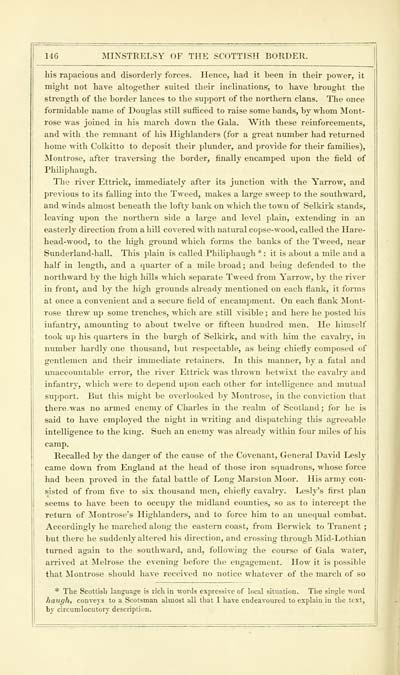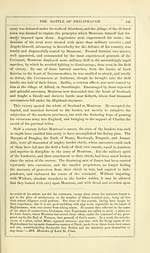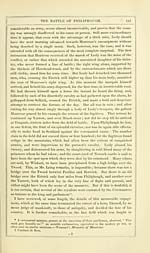Download files
Complete book:
Individual page:
Thumbnail gallery: Grid view | List view

146 MINSTRELSY OF THE SCOTTISH BORDER.
his rapacious and disorderly forces. Hence, had it been in their power, it
might not have altogether suited their inclinations;, to have brought the
strength of the border lances to the support of the northern clans. The once
formidable name of Douglas still sufficed to raise some bands, by whom Mont-
rose was joined in his march down the Gala. With these reinforcements,
and with the remnant of his Highlanders (for a great number had returned
home with CoUiitto to deposit their jjlunder, and pro^"ide for their families),
Montrose, after traversing the border, finally encamped upon the field of
Phili^jhaugh.
The river Ettrick, immediately after its junction with the Yarrow, and
previous to its falling into the Tweed, makes a large sweep to the southward,
and winds almost beneath the lofty bank on which the town of Selkirk stands,
leaving upon the northern side a large and level plain, extending in an
easterly direction from a hill covered with natural copse-wood, called the Hare-
head-wood, to the high ground which forms the banks of the Tweed, near
Sunderland-hall. This plain is called Philiphaugh * : it is about a mile and a
half in length, and a quarter of a mile broad ; and being defended to the
northward by the high hills which separate Tweed from Yarrow, by the river
in front, and by the high grounds already mentioned on each flank, it forms
at once a convenient and a secure field of encamjiment. On each flank ^lont-
rose threw up some trenches, Avhich are still visible ; and here he posted liis
infantry, amounting to about twelve or fifteen hundred men. He himself
took up his quarters in the burgh of Selkirk, and with him the cavaby, in
number hardly one thousand, but respectable, as being chiefly composed of
gentlemen and their immediate retainers. In this manner, by a fatal and
unaccountable error, the river Ettrick was thrown betwixt the cavalry and
infantry, which were to depend upon each other for intelligence and mutual
support. But this might be overlooked by ^lontrose, in the con\"iction that
there was no armed enemy of Cliarles in the realm of Scotland ; for he is
said to have employed the night in writing and disiiatching this agreeable
intelligence to the king. Such an enemy was already within four miles of his
camp.
Recalled by the danger of the cause of the Covenant, General Darid Lesly
came down from England at the head of those iron squadrons, whose force
had been proved in the fatal battle of Long ilarston Moor. His army con-
sisted of from five to six thousand men, chiefly cavalry. Lesly's first plan
seems to have been to occupy tlie midland counties, so as to intercept the
return of ^Montrose's Highlanders, and to force him to an unequal combat.
Accordingly he marched along the eastern coast, from Berwick to Tranent ;
but there he suddenly altered his direction, and crossing through Mid-Lothian
turned again to the southward, and, following the course of Gala water,
ai-rived at Melrose the evening before the engagement. How it is possible
that Montrose should have received no notice whatever of the march of so
* The Scottish language is rich in words expressive of local situation. The single word
haugh, conveys to a Scotsman almost all tliat I have endeavoured to explain in the text,
by circumlocutory description.
his rapacious and disorderly forces. Hence, had it been in their power, it
might not have altogether suited their inclinations;, to have brought the
strength of the border lances to the support of the northern clans. The once
formidable name of Douglas still sufficed to raise some bands, by whom Mont-
rose was joined in his march down the Gala. With these reinforcements,
and with the remnant of his Highlanders (for a great number had returned
home with CoUiitto to deposit their jjlunder, and pro^"ide for their families),
Montrose, after traversing the border, finally encamped upon the field of
Phili^jhaugh.
The river Ettrick, immediately after its junction with the Yarrow, and
previous to its falling into the Tweed, makes a large sweep to the southward,
and winds almost beneath the lofty bank on which the town of Selkirk stands,
leaving upon the northern side a large and level plain, extending in an
easterly direction from a hill covered with natural copse-wood, called the Hare-
head-wood, to the high ground which forms the banks of the Tweed, near
Sunderland-hall. This plain is called Philiphaugh * : it is about a mile and a
half in length, and a quarter of a mile broad ; and being defended to the
northward by the high hills which separate Tweed from Yarrow, by the river
in front, and by the high grounds already mentioned on each flank, it forms
at once a convenient and a secure field of encamjiment. On each flank ^lont-
rose threw up some trenches, Avhich are still visible ; and here he posted liis
infantry, amounting to about twelve or fifteen hundred men. He himself
took up his quarters in the burgh of Selkirk, and with him the cavaby, in
number hardly one thousand, but respectable, as being chiefly composed of
gentlemen and their immediate retainers. In this manner, by a fatal and
unaccountable error, the river Ettrick was thrown betwixt the cavalry and
infantry, which were to depend upon each other for intelligence and mutual
support. But this might be overlooked by ^lontrose, in the con\"iction that
there was no armed enemy of Cliarles in the realm of Scotland ; for he is
said to have employed the night in writing and disiiatching this agreeable
intelligence to the king. Such an enemy was already within four miles of his
camp.
Recalled by the danger of the cause of the Covenant, General Darid Lesly
came down from England at the head of those iron squadrons, whose force
had been proved in the fatal battle of Long ilarston Moor. His army con-
sisted of from five to six thousand men, chiefly cavalry. Lesly's first plan
seems to have been to occupy tlie midland counties, so as to intercept the
return of ^Montrose's Highlanders, and to force him to an unequal combat.
Accordingly he marched along the eastern coast, from Berwick to Tranent ;
but there he suddenly altered his direction, and crossing through Mid-Lothian
turned again to the southward, and, following the course of Gala water,
ai-rived at Melrose the evening before the engagement. How it is possible
that Montrose should have received no notice whatever of the march of so
* The Scottish language is rich in words expressive of local situation. The single word
haugh, conveys to a Scotsman almost all tliat I have endeavoured to explain in the text,
by circumlocutory description.
Set display mode to: Large image | Transcription
Images and transcriptions on this page, including medium image downloads, may be used under the Creative Commons Attribution 4.0 International Licence unless otherwise stated. ![]()
| Early Gaelic Book Collections > J. F. Campbell Collection > Minstrelsy of the Scottish border > (240) |
|---|
| Permanent URL | https://digital.nls.uk/80603305 |
|---|
| Description | Volumes from a collection of 610 books rich in Highland folklore, Ossianic literature and other Celtic subjects. Many of the books annotated by John Francis Campbell of Islay, who assembled the collection. |
|---|
| Description | Selected items from five 'Special and Named Printed Collections'. Includes books in Gaelic and other Celtic languages, works about the Gaels, their languages, literature, culture and history. |
|---|

